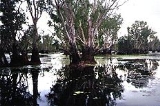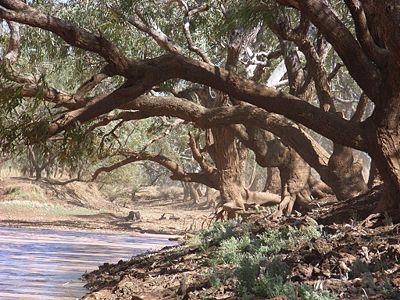
Billabong
Encyclopedia

Australian English
Australian English is the name given to the group of dialects spoken in Australia that form a major variety of the English language....
word meaning a small lake
Lake
A lake is a body of relatively still fresh or salt water of considerable size, localized in a basin, that is surrounded by land. Lakes are inland and not part of the ocean and therefore are distinct from lagoons, and are larger and deeper than ponds. Lakes can be contrasted with rivers or streams,...
, specifically an oxbow lake
Oxbow lake
An oxbow lake is a U-shaped body of water formed when a wide meander from the main stem of a river is cut off to create a lake. This landform is called an oxbow lake for the distinctive curved shape, named after part of a yoke for oxen. In Australia, an oxbow lake is called a billabong, derived...
, a section of still water adjacent to a river, cut off by a change in the watercourse. Billabongs are usually formed when the path of a creek
Stream
A stream is a body of water with a current, confined within a bed and stream banks. Depending on its locale or certain characteristics, a stream may be referred to as a branch, brook, beck, burn, creek, "crick", gill , kill, lick, rill, river, syke, bayou, rivulet, streamage, wash, run or...
or river
River
A river is a natural watercourse, usually freshwater, flowing towards an ocean, a lake, a sea, or another river. In a few cases, a river simply flows into the ground or dries up completely before reaching another body of water. Small rivers may also be called by several other names, including...
changes, leaving the former branch with a dead end. Billabongs, reflecting the arid Australian climate in which these "dead rivers" are found, fill with water seasonally and are dry for a greater part of the year.
The word is most likely derived from the indigenous
Indigenous language
An indigenous language or autochthonous language is a language that is native to a region and spoken by indigenous peoples but has been reduced to the status of a minority language. This language would be from a linguistically distinct community that has been settled in the area for many generations...
Wiradjuri
Wiradjuri language
Wiradjuri is a Pama–Nyungan language of the Wiradhuric subgroup. It was the traditional language of the Wiradjuri people of Australia, but is no longer in general use. The process of reclaiming the language was greatly assisted by the publication in 2005 of A First Wiradjuri Dictionary by elder...
term bilabaŋ. As the lake kept water longer than parts of the river, it was important to the people to name these areas. One source claims a Scottish Gaelic origin of the term.
In popular culture
- Billabongs are referred to relatively often in Australian literatureAustralian literatureAustralian literature is the written or literary work produced in the area or by the people of the Commonwealth of Australia and its preceding colonies. During its early western history, Australia was a collection of British colonies, therefore, its literary tradition begins with and is linked to...
. - Banjo PatersonBanjo PatersonAndrew Barton "Banjo" Paterson, OBE was an Australian bush poet, journalist and author. He wrote many ballads and poems about Australian life, focusing particularly on the rural and outback areas, including the district around Binalong, New South Wales where he spent much of his childhood...
's famous folk song "Waltzing MatildaWaltzing Matilda"Waltzing Matilda" is Australia's most widely known bush ballad. A country folk song, the song has been referred to as "the unofficial national anthem of Australia"....
" takes place beside a billabong.


